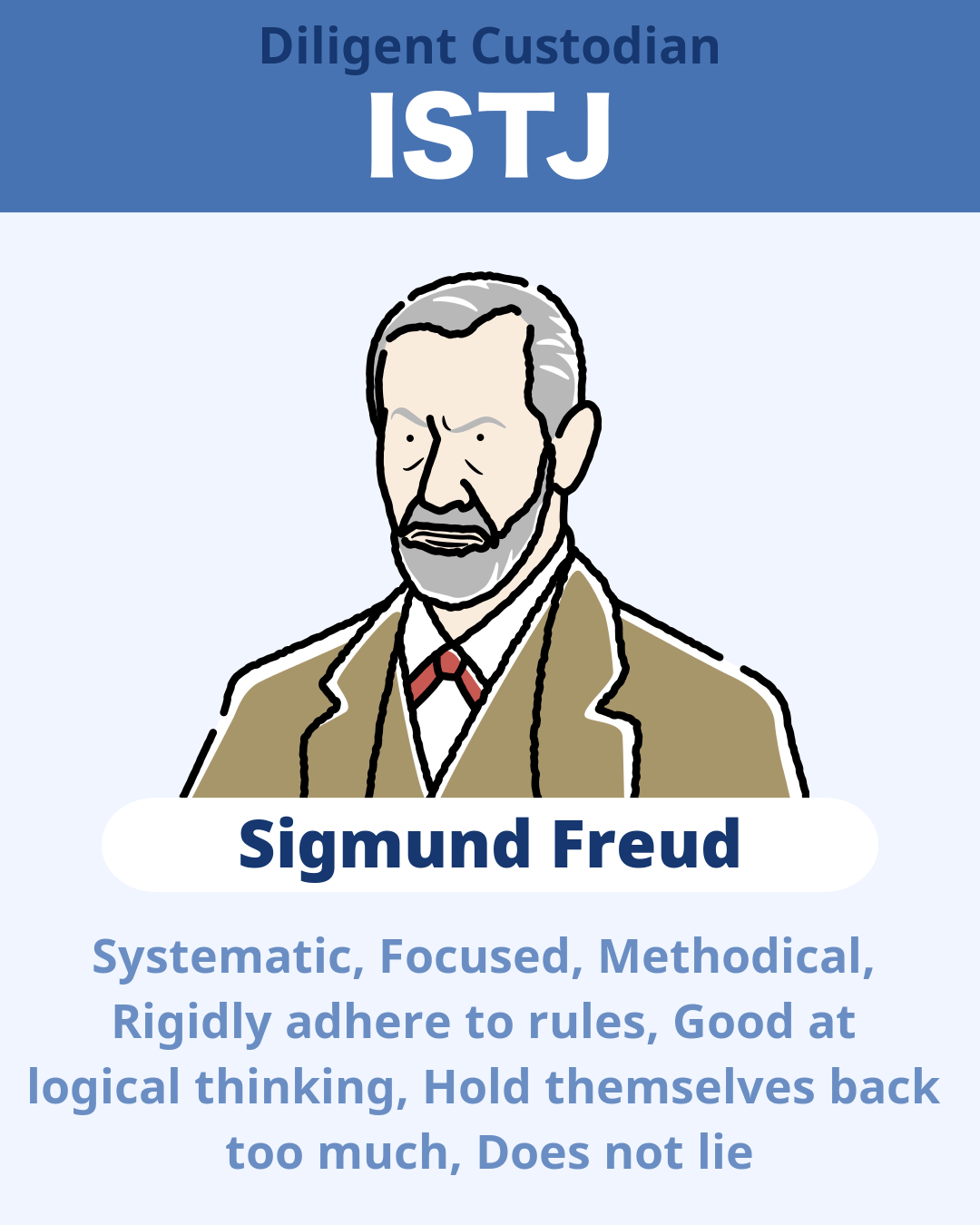
ISTJs are hardworking, diligent people who are steady and do not cut corners in their work. They are calm and collected, and always plan before they act. They are seen as honor students because they rarely make mistakes and follow rules to the letter. People trust ISTJs because they are realistic, emphasize stability, and have a strong sense of responsibility. Because of this, the ISTJ personality type is also known as the Logistician personality type. They prefer to be left to their own devices and are not good team players. They may be thought of as uninteresting because they are not good at speaking, have difficulty expressing their feelings, or do not like creative ideas. ISTJs should take care not to damage their relationships by being harsh with others.





| Ranks | Types | % | |
|---|---|---|---|
| 1 | INFP | Vincent van Gogh | 13% |
| 2 | ENFP | Anne Frank | 11% |
| 3 | ISFP | Mozart | 8% |
| 4 | INTP | Albert Einstein | 8% |
| 5 | INFJ | Nightingale | 8% |
| 6 | ESFJ | Andrew Carnegie | 7% |
| 7 | ISFJ | Mother Teresa | 7% |
| 8 | ESFP | Marie Antoinette | 6% |
| 9 | ENTP | Thomas Edison | 6% |
| 10 | ENFJ | Joan of Arc | 5% |
| 11 | ISTJ | Sigmund Freud★ | 4% |
| 12 | ISTP | Spartacus | 4% |
| 13 | INTJ | Leonardo da Vinci | 4% |
| 14 | ESTJ | George Washington | 3% |
| 15 | ESTP | Columbus | 3% |
| 16 | ENTJ | Napoleon | 3% |
The scientific knowledge of personality types can assist you in discovering more about yourself and others. For instance, knowing the personality of loved ones, family members, coworkers, and other important people can assist you in comprehending their behaviors, what motivates them, and how to better communicate with them.
The ISTJ personality type is the most common type for men and one of the most common types in the population. You likely talk to one often, even if you aren't an ISTJ. So, it's helpful for everyone to know what an ISTJ is like and its strengths and weaknesses.
The Myers-Briggs Type Indicator was the first to identify 16 personality types (MBTI). In the 1960s, American writers Katherine Cook Briggs and her daughter Isabel Briggs Myers developed the MBTI.
Based on Carl Jung's ideas about psychology, the MBTI quickly became an important tool in education and organizational psychology because it gives a good picture of how happy and productive people are at work. The MBTI types also match up well with other personality theories, so the acronyms are utilized in various personality systems.
The I in ISTJ needs to stand for introversion, which shows where your focus and energy come from. More introverted people focus on their thoughts, ideas, images, and reactions. They often find being around many people tiring and stressful, and they prefer to be alone or with a small group of close friends. They usually think about what they will say and do before they say or do it.
The "S" in ISTJ stands for "sensing," which shows how you like to learn new things. Sensing people have paid attention to the real world and the information they get from seeing, hearing, touching, smelling, and tasting.
They remember facts and experiences, and instead of ideas and theories, they focus on practical details and useful information. They learn by doing, and the things they remember best are the ones they have done themselves.
The "T" in ISTJ stands for "thinking," which is how you decide what to do. Instead of focusing on changing situations and different points of view, a person who thinks looks for underlying truths and universal principles. When making decisions, they try to be objective and logical and not let their feelings or the feelings of others affect them. They care that their values are always the same.
The "J" in ISTJ stands for "judge," which is how you want others to see you. A person who is good at judging has a well-planned and organized life. They are good at making lists, and schedules, and meeting deadlines. Because of this, they feel better when choices are made, and plans are set. They also like to keep their lives organized and under control.
"The Inspector" is the name for the ISTJ personality type. An ISTJ is practical, organized, and quiet. They care about loyalty and tradition and put more faith in actions than words. The ISTJ is the only personality type that is as determined as it is. They never give up once they decide to do something.
They pay attention to what's going on around them and pay attention to the details. They also have a strong ability to stay focused and consistent with daily activities and commitments, which helps them reach even difficult goals. The ISTJ personality type is one of the most common in America, making up 11–14% of the population.
However, 14–19% of men are ISTJs, making it the most common personality type among men. The most famous ISTJ in history is the famous detective Sherlock Holmes, who is a fictional character. But Queen Elizabeth II, Robert De Niro, George Washington, and Sigmund Freud are all other well-known ISTJs.
Employers can get a lot out of ISTJs because they are often very productive. People with ISTJ personalities tend to be reliable, focused, careful, and goal-oriented, which most employers might like.
They also like things to be organized and stable and feel most at ease in well-organized places. They work better independently, but when put in teams, they can work well together to reach shared goals as long as their roles are clear and their teammates are reliable.
Excel excels with budget-related tasks: They can often handle jobs that entail data analysis and number crunching. If you want an ISTJ to do well, you might want to give them responsibility for budgets and other financial tasks. Most people with the ISTJ personality type find it easy to do these things.
Handle project management tasks very well: People with the ISTJ personality type also find it easy to handle tasks that require organization and careful planning. This makes them the best candidates for project management roles. Since they are reliable and know how to meet tight deadlines, they can usually handle projects easily and quickly.
Excellent at assuring compliance: ISTJs are adept at managing projects and people. They think that rules and order are necessary for productivity and efficiency, so it's simple for them to make sure that everyone else follows the rules and processes of the company.
With an ISTJ, you always know where you stand. Because they are sure of themselves and have strong values, they don't want to be vague, lie, or try to trick other people. They would rather straightforwardly talk to you.
An ISTJ keeps its promises and does what it says it will do. They are very dedicated and have a strong sense of duty, so you can always count on them to do what they say they will.
The ISTJ is the only personality type that is as determined as it is. They never give up once they decide to do something.
The ISTJ likes things to stay calm and in order. They are very good at making long-term plans, keeping things in order, and doing everything they say they will do. An ISTJ might make a list and check it twice.
Even though this mix of traits might make the ISTJ seem stubborn or resistant to change, they are very open to learning new things. They may also take classes, try out new skills, and ask interesting questions throughout their lives because they like to learn things for themselves. So, they learn many different skills and facts and are always eager to learn more.
The ISTJ's famous openness and honesty in communication can also be cold, blunt, and lacking in tact. Since they aren't particularly emotionally sensitive, they tend to underestimate other people's sensitivity and accidentally hurt their feelings.
The truth is the truth for an ISTJ. Even though they are open to new information changing their minds, they are not easily swayed by feelings, opinions, or points of view. Their insistence on sticking to their point of view can make them hard and stiff, and they often won't change their minds about even the smallest things.
The ISTJ is critical, but that's not always a bad thing. Because their opinions are based on facts and information, they are usually right and should be supported. But one's stubbornness can make it hard for one to change their mind, even when they are wrong.
An ISTJ can feel like the whole world is on their shoulders because they work hard and are responsible. Sadly, this means they often blame themselves once things go wrong, even if it wasn't their fault. This strong sense of duty and accountability can make the ISTJ feel guilty and alone because they have difficulty sharing their problems or asking for help when needed.
Because this type is so common, we probably all know at least one ISTJ, even if we aren't one ourselves. They are quiet, loyal, smart, strong-willed, and very good at getting things done. But unfortunately, they also start taking on too much obligation and don't trust others to help and support them enough.
Their bluntness and shyness can make them feel alone like they don't have many close friends, even though they are very loyal to the people they care deeply about. The fact that ISTJs are judgmental isn't always a bad thing. Because their opinions are based on information and facts, they are often right and should be supported.
The Inspector is a consistent and persistent person, which helps them reach almost any goal they set for themselves and opens up a wide range of professional life and work options. In general, an ISTJ will feel less at ease in a field that involves many outgoing feelings, such as working with children, being an art or design director or teacher, or doing a lot of front-line service work.
For an ISTJ to grow, they must care for themselves and understand their feelings. But how they naturally show love and care doesn't always lead to a strong support system, even though they spend all their time doing things for other people and never talking about themselves.
The Inspector is a good friend, a good coworker, and a great source of steady support. They can also be stubborn, hard, and set in their ways. But ISTJ will be happier and healthier if they take the time to care about themselves and use their hard work to improve their emotional intelligence.
Check out our quick guide to an MBTI-type system to learn more about ISTJs and the other 16 personality types. If you don't know what kind of person you are, check out our list of the best online personality tests to learn more about your weaknesses and strengths.